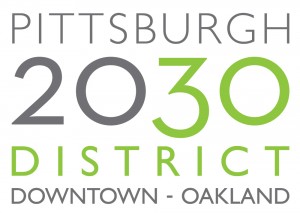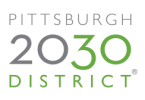The peer to peer network celebrates 4 years of collaboration, shifting the demand towards high performing buildings.
(PITTSBURGH) April 25, 2017 – The Pittsburgh 2030 District, a strategic venture of Green Building Alliance, published its annual Progress Report today, celebrating four years of rigorous reductions in energy use, water consumption, and transportation emissions. More than doubling in area and quadrupling from 81 to 491 committed properties since founding, Pittsburgh leads all 17 established 2030 Districts in committed square footage (including Seattle, San Francisco, and Toronto).
Launched in 2012, the Pittsburgh 2030 District is an internationally recognized collaborative of property owners that spurs regional investment and bolsters the city’s green building leadership. While pushing towards 50% savings in energy, water, and CO2 emissions by 2030, the Pittsburgh 2030 District now includes 4 Pittsburgh neighborhoods: Downtown, Oakland, Uptown, and the Northside. 2030 District Partners collaborate across sectors and size, including the 18thcentury Fort Pitt Block House, all three professional sports facilities, six museums, and a variety of hospitals, universities, and office towers.
ENERGY SAVINGS TO BE REINVESTED REGIONWIDE
In 2016, Pittsburgh 2030 District property partners cut $19 million in energy costs by implementing innovations in lighting, heating, cooling, and ventilation, totaling $53 million in savings since initial reporting. Indeed, the cohort increased total energy avoided by 13% from last year alone, saving 982 million kBtu — or the equivalent CO2emissions of driving a car 271 million miles.
Reflects Allegheny County Executive Rich Fitzgerald, “The remarkable accomplishments of the participants in the Pittsburgh 2030 District allow businesses to reinvest savings and make our region more competitive and sustainable. Energy efficiency programs create thousands of jobs, and Allegheny County is leading the Commonwealth in the clean energy jobs market.”
PEER COLLABORATION DRIVES SUSTAINABLE INNOVATIONS
As a stakeholder-driven cooperative, the Pittsburgh 2030 District advances local and national standards for sustainability. “Property owners and managers have joined together with community leaders, tenants, and service providers to amplify demand for efficient and responsible buildings,” said Angelica Ciranni, Pittsburgh 2030 District Director. “This cross-sector partnership drives innovation in building operations, continuing to shift the real estate market towards higher levels of performance.”
President and CEO of the Pittsburgh Cultural Trust J. Kevin McMahon further elaborates, “The Pittsburgh Cultural Trust is grateful for the 2030 District’s educational platform, which provides a monthly opportunity to collaborate with our peers and industry experts. The Cultural Trust will continue to represent the shared values of resource efficiency, high-performance, and resiliency in Downtown through our 2030 District commitment.”
Aligned with regional initiatives such as p4 and One PGH, the District prompted Pittsburgh to become 1 of 23 cities mandating utilities disclosure from nonresidential properties. This 2016 benchmarking legislation creates transparency in the real estate market, compelling buildings to provide high levels of efficiency and performance. Thanks to Property Partners’ voluntary tracking, 26% of buildings required to disclose are prepared to report their consumption to the City of Pittsburgh.
“Partners in the Pittsburgh 2030 District are doing more than just improving their buildings. They are generating real estate value, increasing resiliency, and developing a more equitable and sustainable city,” says Mayor William Peduto. “The momentum they are building pushes us to imagine a better city for all, and we look to the 2030 Challenge as a benchmark for our accomplishments.”
PITTSBURGH 2030 DISTRICT ACCOMPLISHMENTS BY THE NUMBERS (2016):
Energy: 10.7% reduction below baseline
- 982 million kBtu avoided
- Equivalent to the annual energy use of 11,874 homes; 23,902 passenger vehicles; 264,039 barrels of oil: or 2,212 flights between Pittsburgh and Los Angeles
Water: 7.4% reduction below baseline
- 74.5 million gallons avoided
- Equivalent to the annual water use of 515 homes
Transportation emissions:
- 24.2% reduction (reported in 2015 Progress Report) exceeding 2020 incremental goal of 20% below baseline
- 2015 Make My Trip Count commuter survey gathered 20,710 responses
Indoor Air Quality: In development
- Six Property Partners have participated in a districtwide indoor air quality pilot
- Ongoing effort supports development of scalable, districtwide indoor air quality goals and strategies
ABOUT THE PITTSBURGH 2030 DISTRICT: The Pittsburgh 2030 District is an internationally recognized, locally driven initiative that encourages businesses and building owners to commit to and helps them work towards achieving 50% reductions in energy use, water consumption, and transportation emissions by the year 2030 (below baselines). The private-public partnership is facilitated by Green Building Alliance (GBA), and provides participants with a regular series of opportunities for cohort learning, technical trainings, peer evaluations, and funding opportunities to help realize industry-leading performance outcomes. In 2016, GBA’s Pittsburgh 2030 District received the Pennsylvania Governor’s Award for Environmental Excellence and the Pennsylvania Environmental Council’s Western Pennsylvania Environmental Award.
ABOUT GREEN BUILDING ALLIANCE: Green Building Alliance (GBA) is a nonprofit organization that inspires the creation of healthy, high performing places for everyone through leadership that connects knowledge, transformative ideas, and collaborative action. Headquartered in Pittsburgh, GBA was founded in 1993 and a chapter of the U.S. Green Building Council (USGBC). GBA advances its mission through a variety of strategies and programs, including the Pittsburgh 2030 District, Green & Healthy Schools Academy, Inspire Speakers Series, and robust educational events, technical assistance, and advocacy to the 26 counties of Western Pennsylvania.
Contact:
Natalie Stewart
natalies@gbapgh.org






